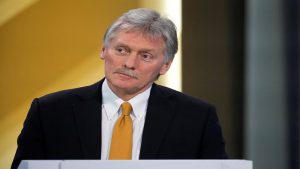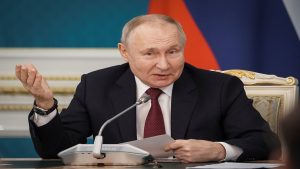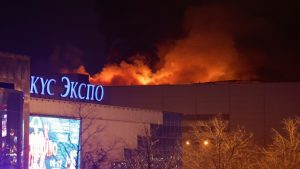Ukrainian President Volodymyr Zelenskyy has urged Russian troops to flee for their lives as his forces launched an offensive near the city of Kherson, saying Ukraine’s military was taking back their territory though Russia said the assault had failed.
Ukraine’s offensive in the south comes after weeks of a stalemate in a war that has killed thousands, displaced millions, destroyed cities and caused a global energy and food crisis amid unprecedented economic sanctions.
It has also fuelled worries of a radiation disaster being triggered by shelling of the south Ukraine Zaporizhzhia nuclear power plant, where Russian authorities on Tuesday reported artillery strikes near a spent fuel storage building.
Zelenskyy, in his nightly address late on Monday, vowed that Ukrainian troops would chase the Russian army “to the border”.
“If they want to survive – it’s time for the Russian military to run away. Go home,” he said.
“Ukraine is taking back its own,” Zelenskyy said.
Oleksiy Arestovych, a senior adviser to Zelenskyy, commenting on the offensive in the Kherson region, said Russian defences had been “broken through in a few hours”.
Ukrainian forces were shelling ferries that Russia was usingto supply a pocket of territory on the west bank of the Dniproriver in the Kherson region, he added.
Britain’s defence ministry said Ukrainian forces had increased their artillery fire across the south and their long-range precision strikes were disrupting Russian resupplies.
Ukraine’s Suspilne public broadcaster reported explosions inthe Kherson area on Tuesday and city residents reported insocial media posts gunfire and explosions but said it was notclear who was firing.
Ukraine’s military general staff, in an early Tuesday update, reported clashes in various parts of the country but gave no information on the Kherson offensive.
‘Failed’
Russia’s defence ministry said Ukrainian troops had attempted an offensive in the Mykolaiv and Kherson regions but sustained significant casualties, RIA news agency reported.
The “enemy’s offensive attempt failed miserably”, it said.
But a Ukrainian barrage of rockets left the Russian-occupied town of Nova Kakhovka without water or power, officials at the Russian-appointed authority told RIA news agency.
Reuters could not verify the battlefield reports.
Russian shelling of the port city of Mykolaiv, which has remained in Ukrainian hands despite repeated Russian bombardments, killed at least two people, wounded some 24 and wiped out homes, city officials and witnesses said on Monday.
A Reuters correspondent reported a strike hit a family home directly next to a school, killing one woman.
The owner of the property, Olexandr Shulga, said he had lived there his entire life and that his wife died when she was buried in debris. “It hit and the shockwave came. It destroyed everything,” he said.
Russia invaded Ukraine on February 24 to wage what it says is a”special military operation” to rid Ukraine of nationalists and protect Russian-speaking communities. Ukraine and its allies describe it as an unprovoked war of aggression.
The conflict, the biggest attack on a European state since1945, has largely settled into a war of attrition, mainly in the south and east, marked by artillery bombardments and airstrikes. Russia captured swathes of the south early on.
IAEA nuclear mission
The Zaporizhzhia nuclear power plant in Ukraine’s south, captured by Russian troops in March but still manned by Ukrainian staff, has been a hotspot in the conflict with both sides trading blame for shelling in the vicinity.
Russian-installed authorities accused Ukrainian troops of firing two shells that exploded near a spent fuel storage building at the plant, TASS news agency reported. There was no immediate comment from the Ukrainian side.
A mission from the International Atomic Energy Agency (IAEA)is headed to the facility, Europe’s largest nuclear plant, and is due later this week to inspect and assess any damage.
Led by IAEA chief Rafael Grossi, the mission will evaluate working conditions and check safety and security systems, the Vienna-based organisation said.
It will also “perform urgent safeguards activities”, a reference to keeping track of nuclear material. A top Russian diplomat said Moscow hoped the mission would dispel misconceptions about the plant’s allegedly poor state.
The Kremlin said the IAEA mission was “necessary” and urged the international community to press Ukraine to reduce military tension at the plant. The mission must do its work in a politically neutral manner, Russia’s foreign ministry said.
The United Nations, United States and Ukraine have called for the withdrawal of military equipment and personnel from the complex to ensure it is not a target.
The Kremlin has ruled out abandoning the site.
EU foreign policy chief eyes green light for Ukraine training mission
Military training
European Union defence ministers might agree in principle on Tuesday on setting up an EU military training mission for Ukraine, the bloc’s foreign policy chief said.
Several EU countries have been training Ukrainian troops fora while individually, mainly enabling them to operate weapons Western nations are delivering to Ukraine to help its fight against Russia’s invasion.
“The situation on the ground continues to be very bad, “foreign policy chief Josep Borrell said as he arrived at a meeting of EU defence ministers in Prague.
“We will continue supporting Ukraine with initiatives such as this training mission which ministers will discuss,” he said, adding: “A general, overall political agreement (on a joint training mission) is what I think we have to get today … I hope we will have a political green light for this mission.”
It is not clear yet where a broader EU training programme could be based and what mandate it might have, and Borrell provided no details.
Later in the day, EU foreign ministers, also meeting in Prague, may agree tightening the issuance of visas for Russians and start debating a wider ban on tourist visas, though EU officials said there was no agreement on that.
“There is war in Europe and not far from here. Russia’s brutal aggression will be the most important topic of our meeting today,” Czech Defence Minister Jana Cernochova said.






